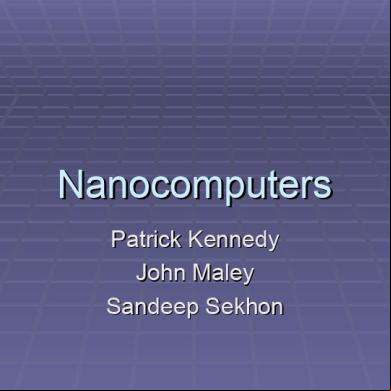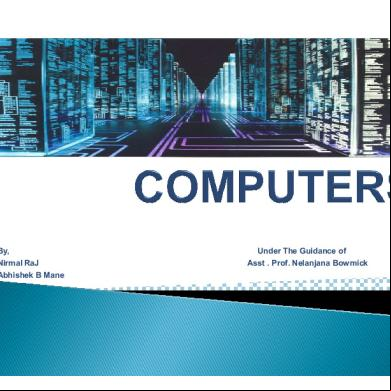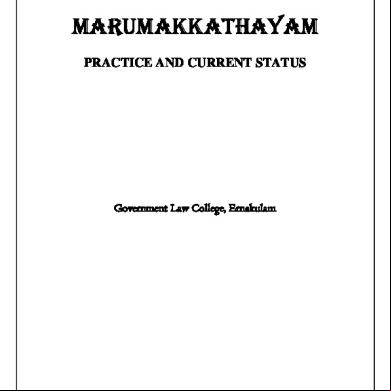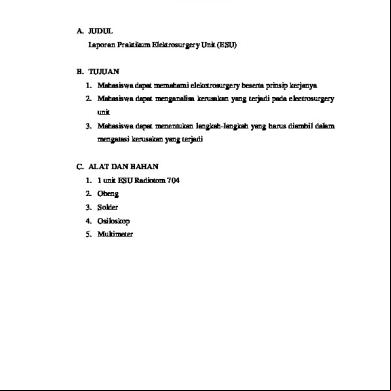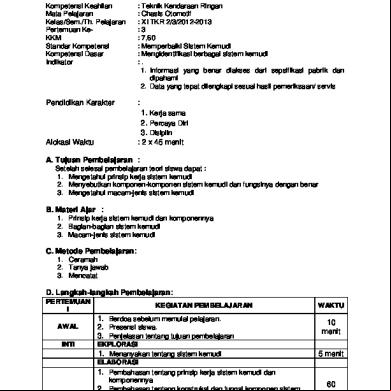Should Computers Replace Teachers 6szo
This document was ed by and they confirmed that they have the permission to share it. If you are author or own the copyright of this book, please report to us by using this report form. Report 3b7i
Overview 3e4r5l
& View Should Computers Replace Teachers as PDF for free.
More details w3441
- Words: 1,010
- Pages: 3
Royal University of Phnom Penh Institute of Foreign Languages Department of English
Academic Year 2013-2014 Writing Skills 301 Major Assignment
Name: M5.03 Class: M3.5 Date: 1/5/2014 Topic: Some people believe that ‘computers’ should replace ‘teachers’ in classrooms while others disagree, saying that nothing can replace teachers in the classrooms. Which group of people do you agree with? your answer with concrete evidence and examples. In this age of technological advance, almost everything is supplanted by computers. In particular, computers have been used to operate a countless tasks ranging from entertainment to research, and the like. Due to its versatility, certain people have started questioning themselves if these electronic machines should replace teachers in the classrooms. While it is good to have computers teach students at schools, it is my belief that teachers are more capable of teaching students in the classroom than computers. Firstly, teachers are flexible. In order words, most of them – if not all – have abilities to manage the classroom environment effectively in all circumstances. For instance, when realizing that students have become bored, teachers can spice up their teaching instinctively with a few jokes or start asking students some funny questions about this and that face-toface. Sometimes, if students are doubtful about particular points in lessons, they can simply raise their hands and ask teachers directly. Teachers, on the other hand, will clarify the misunderstanding parts or reply quickly so that students will hear and take notes. Even when students involve in fights or make a noise, teachers will do whatever they can to handle and minimize the problems. Perhaps the most important reason for studying with real live teachers is most of them are sympathetic and understand the feeling of every students quite well. As Katie Dunn points out in his article Technology Will Not Replace Teachers: Teachers are not, and cannot be automatons handing out information to students. They are leaders, guides, facilitators, and mentors. They encourage students when they struggle, and inspire them to set and reach for their goals. They are role models, leading by example and giving direction when necessary. A computer can give information, but a teacher can lend a hand, or an ear, and discern what's necessary for a student to succeed, and to want to succeed (2013).
Page 1 of 3
Royal University of Phnom Penh Institute of Foreign Languages Department of English
Academic Year 2013-2014 Writing Skills 301 Major Assignment
Secondly, computers require electricity to operate. Electric power serves as the core element of computers while functioning. How much electricity is used depends on the type of a computer, for normally desktops charge about 65 to 250 watts, while laptops use consume less electricity (Ask, n.d.), and they will shut down if the battery is dead. Thus because of its total dependency on the energy, it cannot be relied on most of the time. Imagine a group of students using this sort of machine and suddenly becoming frustrated once it automatically shut down itself because the energy has been cut off. Generally speaking, using computers on daily basis for usual work may not be problematic, but it does turn out to be a complete disaster once they cannot be used when urgent projects are well in hand. Lastly, computers only divert students’ attention away from their studies. They cannot manage the classrooms well. What else can they do aside from providing the students with knowledge? This machine will never know how to react instinctively; how to crack jokes; or how to answer the students’ questions instantly, unless they are played back. Neither can computers have the capacity to make the students pay attention. More importantly, it seems true that computers will only stick to normal intonation unlike human being who can raise and lower the intonation. Furthermore, as Dr. Howard Gadner, the director of Harvard’s School of Education, states, “We have nine intelligences. We use a combination of them to learn and to process information, so a computer only teaching method would not use the best methods for teaching...computer[s] only limit it even further” (qtd. in Answers.com). Therefore, due to its rigidity, learners will not learn at ease at all. Opponents to the aforementioned points may say computers are beneficial in a sense that they equip learners will a variety of study resources. The Internet, they add, is among the most useful tools enabling learners to improve their understanding. While this claim is valid, it is crucial to realize that not all information, particularly those on websites, is realizable. There are certain articles containing wrong sentence structures, grammatical errors, and even inform wrong information. Some authors are unknown or may not use appropriate references and in-text citations. Citations may also not be included. Besides, it can be harmful to Page 2 of 3
Royal University of Phnom Penh Institute of Foreign Languages Department of English
Academic Year 2013-2014 Writing Skills 301 Major Assignment
computers when one unwittingly clicks on any link that is afflicted with virus. The Internet has changed research forever. Ideas and resources that were nearly impossible to locate — let alone actually get your hands on — are at your fingertips. Unfortunately, not all of the material you find is worth your time, and some of it is even destructively wrong (Goodin, 2009). To conclude, despite the significant roles computers play in people’s everyday life today, it still remains true that students need attentions of teachers to facilitate them in studies. Of course, no one can study without using the computers, but, compared to teachers, the fact that computers can take over the teaching of teachers remains questionable.
REFERENCE Answers. (n.d.). Can computers replace teachers in and out of the classroom? Retrieved on 01/20/14 from http://wiki.answers.com/Q/Can_computers_replace_teachers_in_and _out _of_the_ classroom Ask. (n.d.). How much electricity does a computer use per hour? Retrieved on 01/20/2014 from http://www.ask.com/question/how-much-electricity-does-a-computer-use-perhour.html Dunn, K. (2013, 10 19). Technology will not replace teachers. Retrieved on 01/05/14 from The Huffington Post: http://www.huffingtonpost.com/jeff-dunn/teachers-technology _b_4130200.html Goodin, L. E. (2009). Reliable Sources, Wannabes, and Imposters . Retrieved from http://www.lauragoodin.com/editing/articles/reliablesources.html ............................................................................
Page 3 of 3
Academic Year 2013-2014 Writing Skills 301 Major Assignment
Name: M5.03 Class: M3.5 Date: 1/5/2014 Topic: Some people believe that ‘computers’ should replace ‘teachers’ in classrooms while others disagree, saying that nothing can replace teachers in the classrooms. Which group of people do you agree with? your answer with concrete evidence and examples. In this age of technological advance, almost everything is supplanted by computers. In particular, computers have been used to operate a countless tasks ranging from entertainment to research, and the like. Due to its versatility, certain people have started questioning themselves if these electronic machines should replace teachers in the classrooms. While it is good to have computers teach students at schools, it is my belief that teachers are more capable of teaching students in the classroom than computers. Firstly, teachers are flexible. In order words, most of them – if not all – have abilities to manage the classroom environment effectively in all circumstances. For instance, when realizing that students have become bored, teachers can spice up their teaching instinctively with a few jokes or start asking students some funny questions about this and that face-toface. Sometimes, if students are doubtful about particular points in lessons, they can simply raise their hands and ask teachers directly. Teachers, on the other hand, will clarify the misunderstanding parts or reply quickly so that students will hear and take notes. Even when students involve in fights or make a noise, teachers will do whatever they can to handle and minimize the problems. Perhaps the most important reason for studying with real live teachers is most of them are sympathetic and understand the feeling of every students quite well. As Katie Dunn points out in his article Technology Will Not Replace Teachers: Teachers are not, and cannot be automatons handing out information to students. They are leaders, guides, facilitators, and mentors. They encourage students when they struggle, and inspire them to set and reach for their goals. They are role models, leading by example and giving direction when necessary. A computer can give information, but a teacher can lend a hand, or an ear, and discern what's necessary for a student to succeed, and to want to succeed (2013).
Page 1 of 3
Royal University of Phnom Penh Institute of Foreign Languages Department of English
Academic Year 2013-2014 Writing Skills 301 Major Assignment
Secondly, computers require electricity to operate. Electric power serves as the core element of computers while functioning. How much electricity is used depends on the type of a computer, for normally desktops charge about 65 to 250 watts, while laptops use consume less electricity (Ask, n.d.), and they will shut down if the battery is dead. Thus because of its total dependency on the energy, it cannot be relied on most of the time. Imagine a group of students using this sort of machine and suddenly becoming frustrated once it automatically shut down itself because the energy has been cut off. Generally speaking, using computers on daily basis for usual work may not be problematic, but it does turn out to be a complete disaster once they cannot be used when urgent projects are well in hand. Lastly, computers only divert students’ attention away from their studies. They cannot manage the classrooms well. What else can they do aside from providing the students with knowledge? This machine will never know how to react instinctively; how to crack jokes; or how to answer the students’ questions instantly, unless they are played back. Neither can computers have the capacity to make the students pay attention. More importantly, it seems true that computers will only stick to normal intonation unlike human being who can raise and lower the intonation. Furthermore, as Dr. Howard Gadner, the director of Harvard’s School of Education, states, “We have nine intelligences. We use a combination of them to learn and to process information, so a computer only teaching method would not use the best methods for teaching...computer[s] only limit it even further” (qtd. in Answers.com). Therefore, due to its rigidity, learners will not learn at ease at all. Opponents to the aforementioned points may say computers are beneficial in a sense that they equip learners will a variety of study resources. The Internet, they add, is among the most useful tools enabling learners to improve their understanding. While this claim is valid, it is crucial to realize that not all information, particularly those on websites, is realizable. There are certain articles containing wrong sentence structures, grammatical errors, and even inform wrong information. Some authors are unknown or may not use appropriate references and in-text citations. Citations may also not be included. Besides, it can be harmful to Page 2 of 3
Royal University of Phnom Penh Institute of Foreign Languages Department of English
Academic Year 2013-2014 Writing Skills 301 Major Assignment
computers when one unwittingly clicks on any link that is afflicted with virus. The Internet has changed research forever. Ideas and resources that were nearly impossible to locate — let alone actually get your hands on — are at your fingertips. Unfortunately, not all of the material you find is worth your time, and some of it is even destructively wrong (Goodin, 2009). To conclude, despite the significant roles computers play in people’s everyday life today, it still remains true that students need attentions of teachers to facilitate them in studies. Of course, no one can study without using the computers, but, compared to teachers, the fact that computers can take over the teaching of teachers remains questionable.
REFERENCE Answers. (n.d.). Can computers replace teachers in and out of the classroom? Retrieved on 01/20/14 from http://wiki.answers.com/Q/Can_computers_replace_teachers_in_and _out _of_the_ classroom Ask. (n.d.). How much electricity does a computer use per hour? Retrieved on 01/20/2014 from http://www.ask.com/question/how-much-electricity-does-a-computer-use-perhour.html Dunn, K. (2013, 10 19). Technology will not replace teachers. Retrieved on 01/05/14 from The Huffington Post: http://www.huffingtonpost.com/jeff-dunn/teachers-technology _b_4130200.html Goodin, L. E. (2009). Reliable Sources, Wannabes, and Imposters . Retrieved from http://www.lauragoodin.com/editing/articles/reliablesources.html ............................................................................
Page 3 of 3


